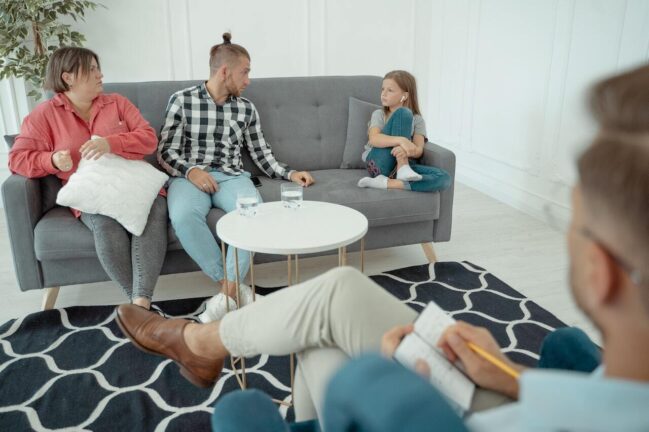Blog
How to Become a Child Counsellor
March 14, 2024
4 minutes, 13 seconds
This article is a guide for people interested in becoming a counsellor for children and young people. It explains what the role entails, the necessary skills like patience and communication, and the qualifications you might need. There are options to get a degree or specialised training, and gaining practical experience beforehand is recommended. You can work in various settings like schools or private practices, and the salary depends on your experience. There are also professional bodies to join for ongoing development.

Counselling for children and young people is a fulfilling and rewarding profession that supports their emotional well-being and assists them in navigating life's challenges. If you are considering a career change and are thinking about becoming a counsellor for children or young people, you’ve come to the right place; here’s our guide to everything you need to know about the role.
UNDERSTANDING THE ROLE OF CHILDREN'S COUNSELLING
Before starting a career in children's counselling, you should get to know the role and responsibilities involved. Children’s counselling provides emotional support and guidance to young people for a variety of issues such as anxiety, depression, trauma, behavioural challenges and family difficulties.
As a counsellor, you will need to create a safe environment where children can express themselves freely, helping them to develop coping strategies and promote their overall well-being.
WHAT SKILLS SHOULD I HAVE TO BECOME A CHILDREN’S COUNSELLOR?
The majority of counselling sessions can take place over 6 to 12 months and so a young person’s counsellor should listen and build a trusting relationship to help their client speak freely.
Other skills to be a counsellor include:
- A deep understanding and compassion for the emotions and experiences of children are crucial for building rapport.
- The ability to listen attentively and empathetically will help you understand your client’s concerns, encouraging them to open up.
- Effective verbal and non-verbal communication skills help children express themselves comfortably.
- Working with children and young people requires patience, as progress may take time – after all, counselling is not often a quick fix.
- Every child is different so flexibility is necessary to adapt therapeutic approaches to meet individual needs.
WHAT QUALIFICATIONS DO I NEED TO BE A CHILD COUNSELLOR?
The majority of employers will require some form of professional training from their counsellors although there are no compulsory qualifications or training required to become a children's counsellor.
It is, however, recommended to go through a specific training programme as not only will this open up your job opportunities, but it will also help you develop skills and understand the standards required of you as a counsellor. There are many options including:
DEGREE PROGRAMS
Studying for a bachelor's or master's degree in counselling, psychology, or a related field would provide you with strong theoretical knowledge and practical skills for working with children and young people.
SPECIALISED CHILD COUNSELLOR TRAINING COURSES
Look for courses specifically on children's counselling that provide all the basic skills you will need as well as an in-depth understanding of the role, hands-on practical experience and supervised internships to enhance your skills. Our Level 6 Diploma in Counselling Children and Young People is a full specialist qualification which gives students a route to apply to join the National Counselling & Psychotherapy Society’s specialist Children and Young People’s Therapist Accredited Register
SHOULD I GAIN PRACTICAL EXPERIENCE BEFORE TRAINING TO BE A COUNSELLOR?
Although understanding the theory is important, gaining practical experience can be invaluable when counselling children and young people.
Look out for opportunities to gain experience through internships, volunteering or working with organisations that focus on children’s mental health. This practical experience will help you apply your knowledge in real-life situations and further develop the skills needed to effectively work with children and young people.
WHERE COULD I WORK AS A CHILDREN’S COUNSELLOR?
There are a variety of options such as schools or other educational settings, nonprofit organisations that specialise in child and youth services or GP surgeries or hospitals, as well as private practices; either your own business or for someone else’s.
Depending on your role, you may work in one place or travel around multiple areas, work from home or from an office. As there are so many options, it should be possible to find a counselling job that suits your needs.
HOW MUCH DOES A CHILD COUNSELLOR EARN?
There is no specific salary information for child counsellors, however, according to Indeed the national average salary for a counsellor is £31,126 per year and the national average salary for a psychotherapist is £45,602. Salaries will vary depending on experience, skills qualifications or specialisation.
CONTINUING PROFESSIONAL DEVELOPMENT (CPD)
After you have completed your training, your learning shouldn’t stop there! Look at joining short courses that will help you develop specific skills. At Chrysalis we host a variety of different 4 or 7 hour CPD workshops which are specially designed to provide you with new skills and knowledge in many different areas relevant to your practice.
You should also look to join a professional body that provides ongoing development such as:
NATIONAL COUNSELLING & PSYCHOTHERAPY SOCIETY (NCPS)
NCPS provides membership, accreditation, and continuing professional development opportunities for counsellors working with children and young people.
ASSOCIATION FOR CHILD AND ADOLESCENT MENTAL HEALTH (ACAMH)
ACAMH promotes research, knowledge exchange, and professional development in child and adolescent mental health.
BRITISH ASSOCIATION FOR COUNSELLING AND PSYCHOTHERAPY (BACP)
BACP offers membership, accreditation, and resources for counsellors, including specialised divisions focused on children and young people.
Are you interested in studying counselling with Chrysalis Courses? Check out our counselling courses or request a prospectus.